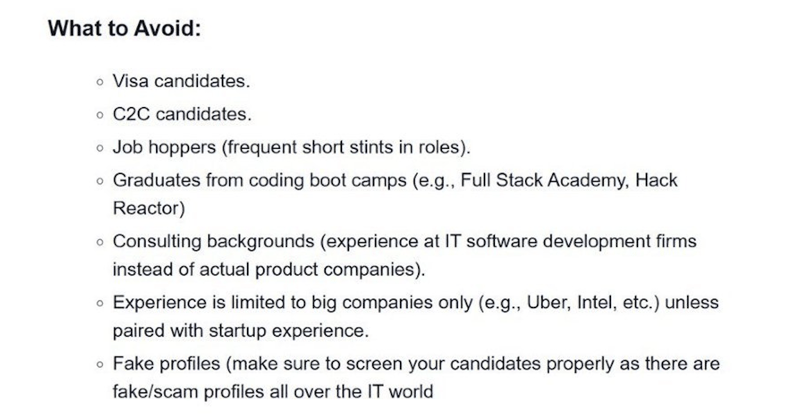Maybe you've come across this image in your dev feeds (X, Reddit, LinkedIn...)
It's supposed to be a list of hidden requirements from an American recruiter. (I'd love to link the original Reddit post, but I can’t seem to find it anymore—damn you, algorithm ✊!)
As expected, people are overreacting—because, well, that’s what social media is for 💃
my two cents.
#1 No visa candidates: Coming from one of the poorest countries in Europe, I’ve personally hit this wall when considering American companies. I don’t blame them; visa sponsorship is expensive and bureaucratic.
#2 No C2C candidates: (Used ChatGPT for this one because I wasn’t sure) This seems to refer to "Corp-to-Corp" contracts, involving third-party consulting firms. Got it—bureaucracy.
#3 No job hoppers: I get this one. Many years ago, at a startup, it was just the CEO and me at the beginning, and she had this rule: "If someone changes jobs every year, I’m not even bothering with an interview." Why? Because she didn’t want to go through hiring again in a year. She took for granted that we weren’t special.
#4 No bootcamp graduates: This likely stems from past bad experiences. Let me be blunt: 2 years ago, we hired an entire batch of bootcamp graduates as interns... and it didn’t go well. Not because of their technical skills (which were actually top-notch), but because of their maturity.
They were, on average, ~21 years old, with unrealistic expectations and, most notably, overconfidence. Especially overconfidence. Only about 10% made it past the test period.
#5 No consulting backgrounds: I guess, similar to the bootcamp case, this probably comes from negative past experiences.
#6 Experience is NOT limited to big companies: ... ok so in overall, I think they're looking for a profile with entrepreneurial skills, not someone from a large corporation.
Hiring is a two-way street. A company is a private entity, and it has every right to define its own hiring criteria.
Hot take: none of this is outrageous.
If only they could make these things public?... it would save everyone a lot of time and frustration. The only thing I’d demand is more transparency in hiring criteria but the points seem fair to me.
WDYT?




Top comments (3)
I've always wonder why we don't judge a company for having too many clients, but we (I mean employers/recruiters) judge someone for having too many jobs?
You're right hiring is a two-way street. My guideline when l'm looking for job is if I don't get a clear picture of salary/compensation in the first meeting, I don't continue interviewing with that company.
Agree 101% here
I agree that none of this is particularly surprising or outrageous (and this is the first time I've seen this).
I assume that this is below a list of "what to look for" and the context is important. Even if you match some of the "what to avoid" bullet points, you wouldn't necessarily be rejected, especially if you were strong on some of the "what to look for" points.
The practice of using bullet points to do a first pass and reject candidates is unfortunate but I also don't see how it can be any other way since it's just not feasible for a company to interview everyone who applies.
It's important to have a resume that emphasizes your strengths. If your experience isn't strong enough to consistently generate interest from recruiters then you have to play the numbers game (applying to as many jobs as possible) which sucks but will work eventually if you keep the faith. But that also perpetuates a vicious cycle of companies being overwhelmed with applicants and needing to do an even rougher first pass on them.
Fortunately once you do get a job then that extra experience on your resume (especially if you're there 2+ years) makes you a much stronger candidate next time around.
Some comments may only be visible to logged-in visitors. Sign in to view all comments.